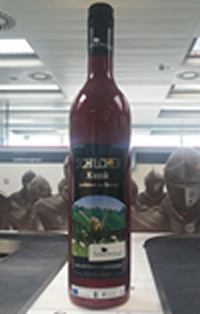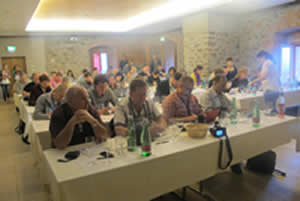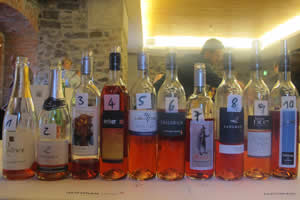|
 As you enter the Arrival Hall of Graz Airport to collect your baggage, you are greeted by a huge replica of a red wine bottle on the carousel, which on closer look reads Schilcher Klassik on the label. You don’t have time to read the rest because the baggage arrives (incidentally, the fastest delivery I have come across anywhere in the world-they seem to fly it from the aircraft to the carousel). As you enter the Arrival Hall of Graz Airport to collect your baggage, you are greeted by a huge replica of a red wine bottle on the carousel, which on closer look reads Schilcher Klassik on the label. You don’t have time to read the rest because the baggage arrives (incidentally, the fastest delivery I have come across anywhere in the world-they seem to fly it from the aircraft to the carousel).
What is Schilcher
What is Schilcher? What do you say when your host suddenly springs on you,’ how about a Schilcher?’ (pronounced as Shil-kher, as in ‘dil’ and ‘khayal’ in Hindi). You may expect a glass of cold beer but get a glass of chilled Rosé instead.
In Western Styria (Weststeieirmark), this rose-style wine, still or bubbly, is made from an ancient grape variety, Blauer Wildbacher related to Blaufränkisch. The wine is usually intensely perfumed with exclusive aromas of strawberry, raspberry or red currant - earthy and herbal aromas. It’s dry, aggressively crisp, robust and slightly tannic with the colour of salmon but varying from light onion tinge to deep ruby red.
Schilcher is produced only in Western Styria in the districts of Deutschlandsberg and Voitsberg, bordering with Slovenia and Carinthia to the south and west. The grape was once labelled as a wild variety containing alcohol compounds that induced wild inebriation as our Guide informed us at the Burg Landsberg Castle in Deutschlandsberg- our first stop where we also attended the guided tasting of 10 wines conducted by the Austrian journalist Luzia Schrampf. I had already enjoyed one from the biodynamic producer Franz and Christina Strohmeier the previous day.
Smallest growing area
The wine growing area is the smallest in Europe. Out of a total of 500hA planted in western Styria, 450 hA boast of this unique variety of Blauer Wildbacher. In the 1970s it was much smaller with only 190 hA of plantation. It’s named after a small river (a brook really) called Wildbach that we passed on our way from Graz to the castle. Authentic Schilcher wine must also carry the official emblem of the white horse from the world-famous Spanish Riding School in Vienna. with only 190 hA of plantation. It’s named after a small river (a brook really) called Wildbach that we passed on our way from Graz to the castle. Authentic Schilcher wine must also carry the official emblem of the white horse from the world-famous Spanish Riding School in Vienna.
Production of Schilcher is governed by the wine laws in 1976 when Klassik (that one reads on the label of the giant bottle at the airport) or Classic was also introduced. A Klassik has to be of course made from 100% Blauer Wildbacher, must not have more than 3 gms./liter of residual sugar, undergo no malolactic fermentation and with no use of oak. The producers may choose not to call it Klassik for any number of reasons. The racy acidity is due to the high level of acid that usually ranges from 7-9 gms. Alcohol is more than 11% and usually varies from 11-12%.
The grape is thick skinned, susceptible to late season frosts. It’s a cool climate grape grown mostly on the South facing slopes at a vineyard height of 500-600m. Average holding of a grower is 5-6 hA which is small but still slightly higher than the national average of less than 5 hA for Austria. One needs to have a land of 7-8 hA to feed the entire family.
Rieterer, who specialises in sparkling Schilcher, has more land. Slightly sweet at 11 gms of sugar, this was the first sparkling wine we tried at the Tasting. Higher acid level of 8 gms/ liter made it a balanced wine that would delight the Indian palates. My top picks out of the 10 wines we tasted were from Langmann (89/100) and Hiden (91/100) Wineries. Both were dry Classics from the village of Hochgrail, which is supposed to be most representative of the Blauer Wildbacher grape variety due to the Schist soil. Interestingly, both of them were moderately priced at € (less than €10). Other wineries represented at the Tasting were Mueller, Weber, Fam. Hainzl-Jauk, Friedrich Christian, Oswald and Johannes & Louise Joebstl-most in the € price category too.
 Due to the small production that cannot be increased due to paucity of land, it is not exported much though strangely, due to the efforts of a Norwegian promoter who loved the wine, it has become a big success in Norway where it is a big favourite with cold heavy meats-a natural match for this wine. One may find it in Vienna restaurants where it usually sells for €20-30. In Styria one can find it usually for €10 or less although the sparkling wines are around €11-12 depending on whether they are produced by the cheaper Charmat method or the ‘Methode Traditionelle.’ Due to the small production that cannot be increased due to paucity of land, it is not exported much though strangely, due to the efforts of a Norwegian promoter who loved the wine, it has become a big success in Norway where it is a big favourite with cold heavy meats-a natural match for this wine. One may find it in Vienna restaurants where it usually sells for €20-30. In Styria one can find it usually for €10 or less although the sparkling wines are around €11-12 depending on whether they are produced by the cheaper Charmat method or the ‘Methode Traditionelle.’
There have been recent attempts to make red wine out of this grape. In fact, in Veneto a couple of producers are also known to be doing so. But the quality has not been very encouraging so far with several challenges and with the limited quantity of grapes available, the focus is still to make Schilcher.
It’s highly unlikely that this wine will ever find its way into India. They say that you love Schilcher or hate it. I love it for its sensuous aromas and tart, dry but fruity and fresh flavours and the possibility of its great match with Indian foods like bhartha, mushrooms, bhuna mutton and chicken tikka masala . If you ever visit Graz, this is a must-try wine. Or try finding it in a restaurant on your next visit to Vienna-you will love to start your meals or the evening with a glass or two of the bubbly Schilcher or even a still Rosé.
And next time when someone takes your picture, don’t say Cheese but yell out Schilcher!
Subhash Arora
For a few of the earlier related articles, please visit:
Austrian Wine  : Gobelsburg : Shattering Myth about Whites : Gobelsburg : Shattering Myth about Whites
Austrian Wine  : Klinger Scores 100 Points : Klinger Scores 100 Points
Austrian Wine  : New Appellation of Leithaberg DAC : New Appellation of Leithaberg DAC
Austrian Wine  : Vines Full of Knots and Crosses : Vines Full of Knots and Crosses
Tags: Austria, Grüner Veltliner, Schilcher, Blauer Wildbacher, Western Styria, Austrian Wine Summit, Schilcher Klassik, Weststeieirmark, Blaufränkisch, Deutschlandsberg, Voitsberg, Burg Landsberg Castle, Deutschlandsberg, Luzia Schrampf, Franz and Christina Strohmeier, Wildbach, Graz, Spanish Riding School, Klassik, Rieterer, Langmann, Hiden, Hochgrail, Mueller, Weber, Fam. Hainzl-Jauk, Friedrich Christian, Oswald and Johannes, Louise Joebstl, Norway |